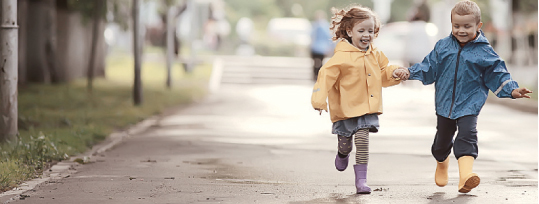
by Sally-Ann Barker
Potter’s House Preschool
While the country is in a state of limbo and we’re all trying to find the new normal or taking tentative baby steps to the old one, I’ve found myself overwhelmed with awe and wonder at the world that surrounds us. Amongst all the doom and gloom in the press, the media has, on occasion, provided us with heart-warming articles detailing how this unprecedented global crisis has affected nature in a rather more positive way.
Throughout lockdown, nitrogen dioxide levels dropped by more than 50% in some areas across the UK. Road traffic in the UK fell by more than 70% meaning there was a significantly lower toll for road kill and councils delayed the cutting of grass on roadside verges crucially providing more pollen for our bees. Further afield, wild boar became braver in Barcelona, peacocks have been wandering around Llandudno and dolphins have been spotted frolicking in Venice. Closer to my home in Sussex, swans have apparently returned to Storrington duck pond for the first time in 15 years. This was however according to my father-in-law and on closer inspection they turned out to be plastic decoy ones used to deter Canada Geese. Perhaps he should take a drive to Barnard’s Castle to check his eyesight!
I have always had a passion for Early Years education and have spent my career observing the impacts that differing environments have on children’s development. In my experience, I believe that access to outdoor play is hands down the most enriching thing we can give our children and indeed ourselves. As a result of my personal observations and experiences, I try to make sure that my preschool is predominantly outdoor based with access to indoor play and absolutely not the other way around.
The Covid-19 pandemic has inevitably provoked discussion amongst my staff and I regarding how nurseries and preschools should be operating under these new conditions. We’ve been forced to reassess our procedures, draw up reams of fresh risk assessments and develop totally new routines. We’ve been made to think about how we are going to try to keep these precious little people, and our staff, as safe as we can in these difficult times. We recognise that we must maintain the highest levels of care, whilst also ensuring everyone’s mental health remains positive. I began researching a substance called Phytoncides, which are emitted by trees and plants and are widely used in holistic, veterinary and aromatherapy medicines in Russia and Japan. Phytoncides have antibacterial and antifungal qualities that assist plants in fighting disease. When we breathe in these chemicals, our bodies increase the activity of white blood cells, which in turn kills off virus infected cells and boosts our immune system. So, given all of that, surely the safest place for us all is outside. Science says so!
As a rule, as the winter approaches, we inevitably spend far less time outside and are drawn to the warmer areas inside to keep cosy. When I was a child, we had no option but to stay inside at playtime if it was wet or windy which I feel conditioned us to regard wet weather as ‘bad weather’. But really, providing we are properly equipped then there is no such thing. The children in our setting come to preschool all wrapped up in snow suits and boots and hats and gloves and they still choose to be outside making potions in the mud kitchen – using every single one of their senses to explore and learn organically. It sometimes takes some convincing for parents to understand why we are still outside in the depths of the wet British winter, but I know that even the most dubious will come back to tell us that their children went home happy, that they ate well and they slept well – which is the bare minimum we want as parents.
In Sweden, outdoor nurseries are called ‘I Ur och Skur’ meaning ‘rain or shine’ and their children thrive. They are among the happiest and healthiest children as well as achieving academically later on in life. At our preschool we have adopted this pedagogical approach in developing our children – teaching them to be resilient and brave, encouraging them to manage risk and emotion. Ultimately, we want them to explore and respect the nature that surrounds them with their eyes wide and their minds curious.
So, come rain or shine we are always outside and as a result, the children are happy, healthy and developing beautifully. We will continue this practice (with added health and safety precautions because of the pandemic) and we will watch, wrapped up warm, as our children fight off all the nasty winter bugs.
For more information please contact Sally-Ann at sallyann@pottershousepreschool.co.uk or call 07375 379148 www.pottershousepreschool.co.uk











